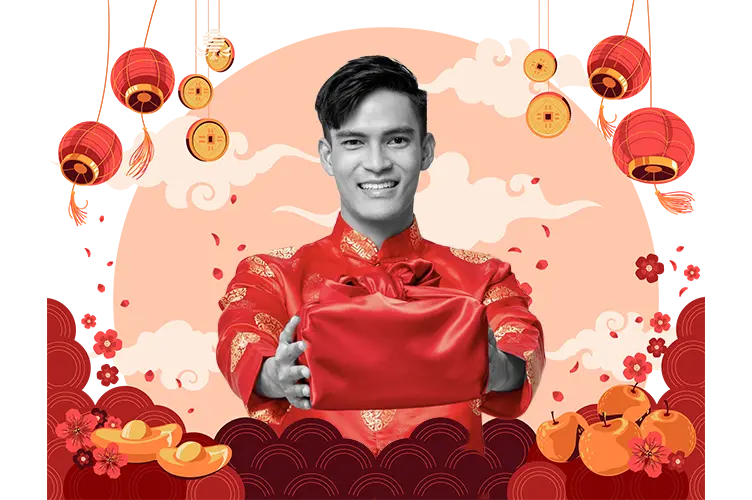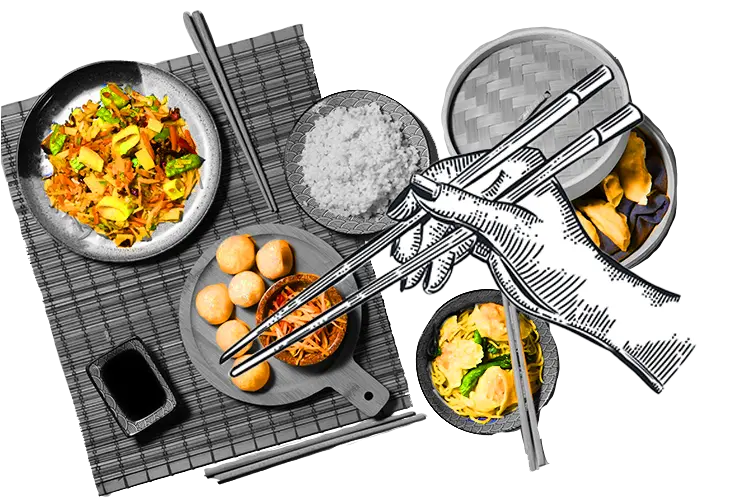
With fun customs like firecrackers and lion dancers to scare off evil spirits, Chinese culture is filled with beautiful wedding traditions. There are a few Chinese wedding traditions in particular, though, that you should be aware of, whether you’ve been invited to a traditional Chinese wedding, or you want to incorporate this culture’s traditions into a more modern wedding.
Symbolism plays a large role in Chinese weddings.
Red and gold often appear in Chinese wedding decorations, since red is associated with love, success, happiness, prosperity, luck, fertility, honor, and loyalty, while gold symbolizes wealth.
Then, there’s the Double Happiness symbol, composed of two, identical Chinese characters that mean joy. This symbol may appear in a wall hanging during a tea ceremony or as a neon sign at an after-party.
Other auspicious symbols include dragons, phoenixes, and mandarin ducks, all signs of happiness and loyalty.

The Guo Da Li Chinese Wedding Custom takes place before the wedding ceremony. The soon-to-be husband presents betrothal gifts, such as gold jewelry, dragon and phoenix wax candles, tea leaves, wine or brandy, etc., to the bride’s parents. The parents return half of the gifts as an acceptance of the proposal and to show that they wish to establish a good relationship with the groom’s family.
A traditional Chinese wedding invitation typically features a red exterior with gold lettering and the Double Happiness symbol. Inside, the wedding card will include…
Preparing the marriage bed, or the tradition of An Chuang, usually takes place on an auspicious day and time, two or three days before the wedding. An older female relative will dress a bed in new red bedding and pillows, with a mix of dried fruits and nuts such as longans, persimmons, or red dates.
Once the bed is prepared, no one can sit or sleep on it until the couple, at the end of the wedding night. The combination symbolizes a sweet and long-lasting marriage, blessed with fertility and well wishes.

The hair-combing ritual is performed the night before the wedding to symbolize the couple entering a new stage of adulthood.
In their individual homes, the bride and groom will shower with pomelo leaves to cleanse off bad spirits, and change into new red clothes and slippers. Then, the bride will sit in front of a mirror or a window, while the groom sits facing the inside of the house. The respective parents will prepare a pair of red taper candles, scissors, one stick of incense, a wooden ruler, a hair comb, and red yarn with cypress leaves.
Once everything is prepared, a woman of good fortune will light one stick of incense and the pair of red taper candles, to signify the start of the hair-combing ceremony. While she is combing the bride or groom’s hair, she will recite blessings to the bride or groom, such as:
May the first comb bring you a long-lasting union
May the second comb bring you a harmonious union
May the third comb bring you an abundance of descendants
May the fourth comb bring you prosperity and longevity
After the bride or groom’s hair is combed four times, the woman of goo d fortune will clip the red yarn with cypress leaves into their hair, completing the ceremony.
Chuangmen, also known as “door games,” test the groom’s determination to marry the bride and to win approval from the bride’s family.
Tasks vary; however, the games usually involve testing the groom’s knowledge of the bride, and eating something spicy, sour, bitter, and sweet to prove that he can withstand every stage of marriage. Typically, at least one challenge tests the groom’s pain tolerance.
After passing these challenges, the groom will hand over a red packet with money to the bridesmaids, for them to “surrender” their friend. Only upon acceptance of this money and winning all the games, will the bridesmaids allow the groom to enter the bride’s room, where the final challenge is to locate the missing bridal shoe, place it on the bride’s foot, and then carry her to the Chinese tea ceremony.

During the Chinese tea ceremony, the bride and groom express their respect, gratitude, and appreciation for their parents’ love, support, and effort in raising them. The ceremony occurs at a single location and is a family affair.
A bridesmaid or lady of good fortune will present the teacups to the couple, who then serve tea to their parents. The groom’s family is always served first and, after each parent takes a sip, the couple receives a red envelope with money or gold jewelry, blessing the union.
The soon-to-be-married couple will then serve tea to the paternal grandparents, older uncles/aunts, younger uncles/aunts, and then older married siblings, repeating the same order for the maternal side of the family.
The Chinese tea ceremony is almost always conducted using a red tea set featuring a Double Happiness symbol, and the tea served is a black tea sweetened with dried longans, lotus seeds, and red dates.
The Chinese wedding banquet is typically a lavish and expensive event. Guests sign their names in a book or scroll and present extravagant gifts as they arrive and, once the dinner begins, the bride will change into a traditional, usually larger, red Chinese wedding dress.
In traditional Chinese culture, parents host separate wedding feasts for their guests.
Since many foods are considered symbolic in Chinese culture, the types of foods served at traditional Chinese weddings are very important. For instance, serving a whole fish is a sign of abundance, sweet lotus seeds symbolize a wish for fertility, and consuming rice balls means the families will be happy forever. There are usually six to 10 courses served during the banquet, and both the bride and groom change clothes between the third and sixth courses.

Historically, the day after the wedding, the bride will wake up early to honor her ancestors at dawn, and then prepare a breakfast for both families. Older relatives present small gifts at this time, and the groom formally introduces the bride to his family, who will give the bride a formal title within the family.
Three days after the wedding night, the bride and groom visit the bride’s family. At this time, the bride is no longer considered a part of her family, but they welcome her as a guest. The groom presents a roasted pig, and they enjoy a meal together.
Modern Chinese weddings will typically occur over a full, single day, as would an American wedding. Nonetheless, this timeline does depend on how many traditional customs are included. Chinese weddings can last up to three days.
In American culture, usually, the bride’s parents cover most, if not all, of the wedding expenses. However, in traditional Chinese wedding culture, the groom’s family is expected to pay for most of the wedding.
In traditional Chinese culture, engagement rings are worn on the middle finger, while wedding rings are worn on opposite hands. The bride wears a band on her right hand, while the groom wears his on the left.
There’s a superstition in Chinese culture that it is extremely bad luck to marry if you and your partner are separated by a three or six-year age difference. So, for example, if you’re 25 years old, you wouldn’t want to marry someone who is 22 or 31.